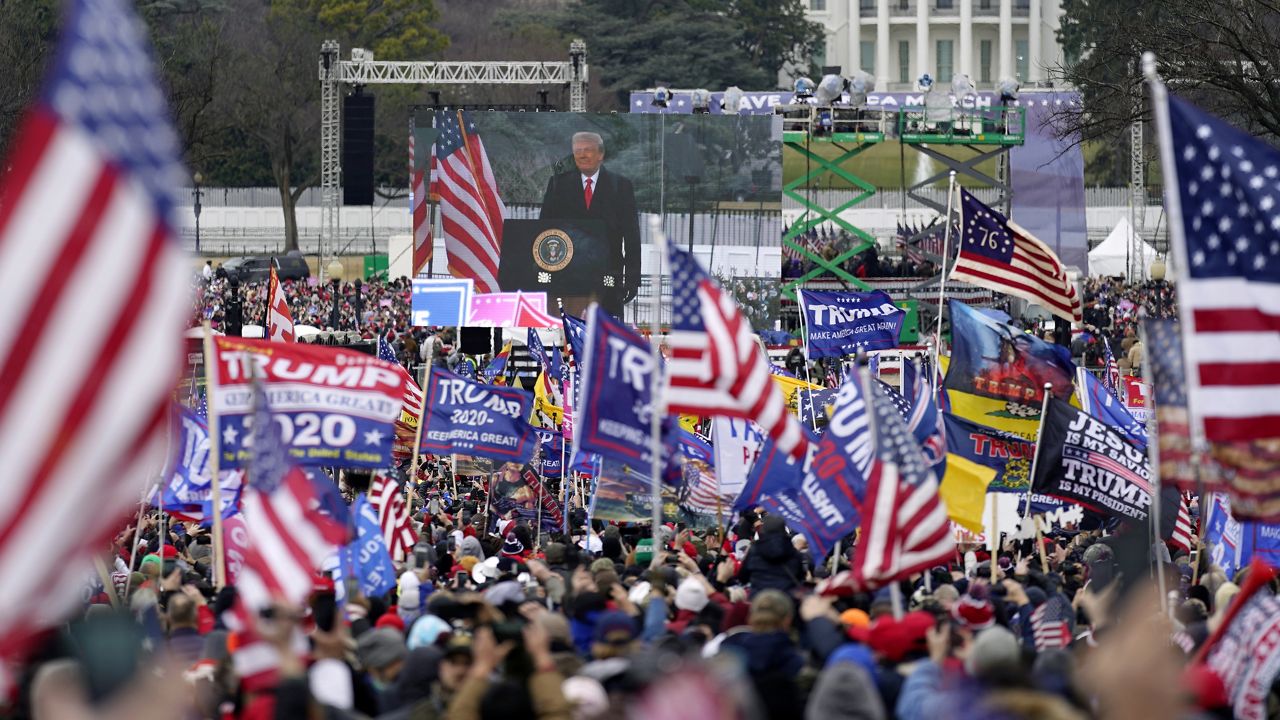House Democrats have formally made their case against former president Donald Trump, accusing him of stirring his supporters "into a frenzy" at a rally ahead of the Jan. 6 insurrection at the U.S. Capitol, laying the blame for the deadly riot directly at his feet.
The former president faces trial for his role in the deadly riot, with Democrats accusing him of aiming his supporters "like a loaded cannon" at the Capitol, as well as the lawmakers inside who were doing their consitutional duty of certifying the results of the November election.
“If provoking an insurrectionary riot against a Joint Session of Congress after losing an election is not an impeachable offense, it is hard to imagine what would be,” the nine House Impeachment Managers argue in a pre-trial legal brief filed Tuesday.
Five people were killed in the deadly riot, including U.S. Capitol Police Officer Brian D. Sicknick. The brief points fingers at Trump for his role in the insurrection, as well as arguing against that Trump's speech is protected by the U.S. Constitution.
The managers argue that the former president's speech is not protected under the First Amendment; rather, they argue that his incitement of violence in an attemt to overturn the election results was "a direct assault on core First Amendment principles," and "holding him accountable through conviction on the article of impeachment would vindicate First Amendment freedoms."
"His conduct endangered the life of every single Member of Congress, jeopardized the peaceful transition of power and line of succession, and compromised our national security,” the impeachment managers wrote. "This is precisely the sort of constitutional offense that warrants disqualification from federal office."
The trial begins on Feb. 9.
Trump's defense team filed their brief on Tuesday, which makes the claim that Trump cannot be tried for impeachment since he no longer holds office, and argues that "as a private citizen, the Senate has no jurisdiction over his ability to hold office."
Trump attorney David Schoen previewed some of what the former president's defense team's arguments on Fox News Monday night, slamming the case as needlessly divisive and branding it "the most ill-advised legislative action that I’ve seen in my lifetime."
Schoen, a criminal defense and civil rights lawyer, called impeachment "the weapon they’ve tried to use against him," referring to Democrats, and said that barring Trump from running for office again is "about as undemocratic as you can get."
The Constitution says that disqualification from office is valid punishment for an impeachment conviction.
"This is not a case where elections alone are a sufficient safeguard against future abuse; it is the electoral process itself that President Trump attacked and that must be protected from him and anyone else who would seek to mimic his behavior," the brief says.
Though no president has been tried after departing the White House, Democrats say there is precedent, pointing to an 1876 impeachment of William Beklnap, secretary of war under former president Ulysses S. Grant, who resigned a last-ditch attempt to avoid an impeachment trial, which the Senate ultimately held anyway.
"There is no 'January Exception' to impeachment or any other provision of the Constitution," the impeachment managers wrote. "A president must answer comprehensively for his conduct in office from his first day in office through his last."
The Democrats also noted Trump's unsuccessful efforts to lobby former Attorney General William Barr and Georgia's Secretary of State Brad Raffensperger to overturn the results of the election.
The impeachment managers allege that Trump became "fixated" on Jan. 6 and claimed that he "was comfortable urging, approving, and even celebrating violence," specifically citing the violent extremist group the Proud Boys – who Trump told to "stand back and stand by" at a presidential debate in September – and a caravan of Trump supporters who tried to run a bus full of Biden campaign workers off the road in Texas in October.
"Given all that, the crowd which assembled on January 6 unsurprisingly included many who were armed, angry, and dangerous—and poised on a hair trigger for President Trump to confirm that they indeed had to “fight” to save America from an imagined conspiracy,” the brief reads.



